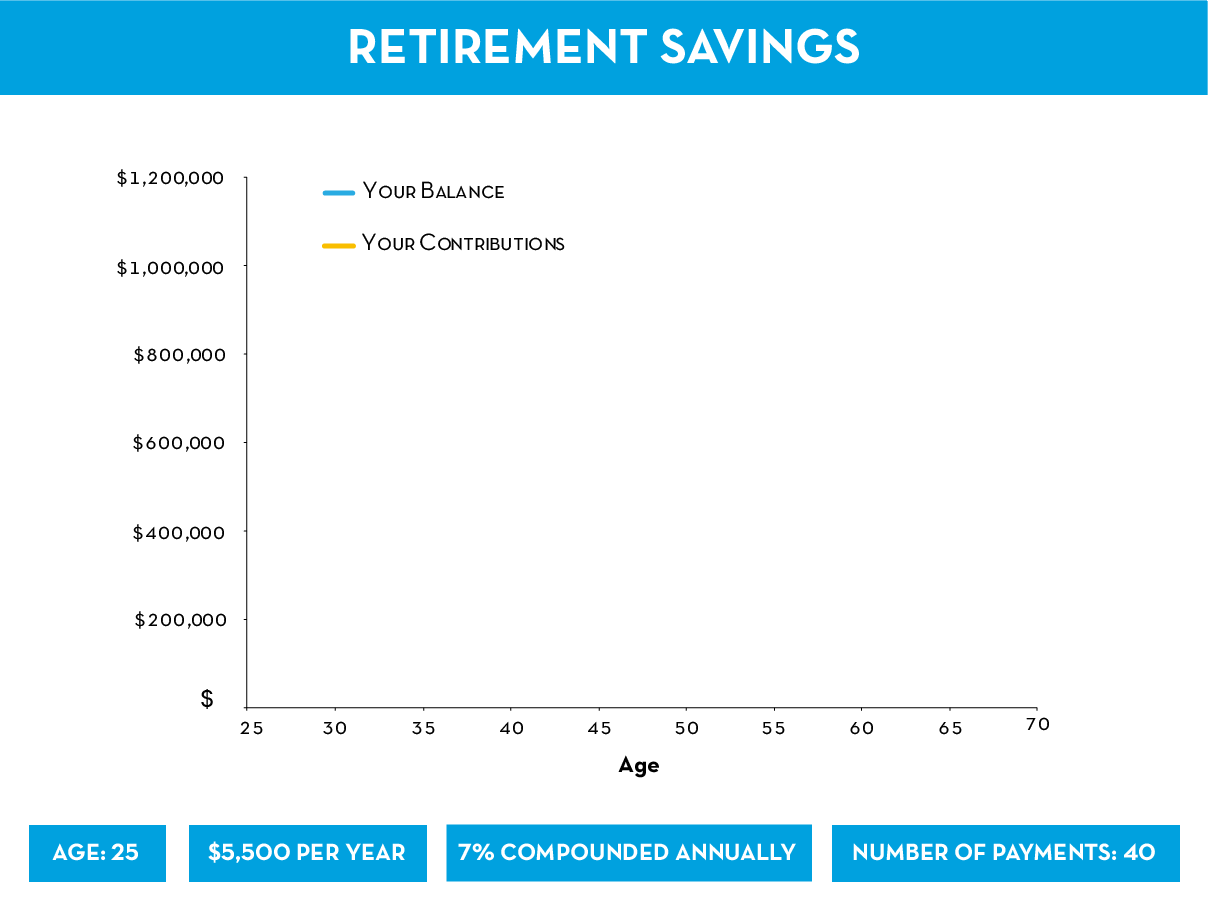Addressing your financial goals early on in life can be a substantial advantage even though it’s difficult to do. We all want to focus on our current desires, but those who are beginning their careers often see retirement as such a distant goal that it’s difficult to view the potential benefits of a secure retirement as a priority given many competing interests in their lives. “Won’t I have time to think about this later?” is an easily understandable sentiment when there are other financial objectives at hand. Hopefully, some of the advantages of starting to save for retirement early will provide convincing reasons to let time do some of the work for you.
Time is on your side. When you make the commitment to invest in your 30s or even better yet your 20s, there are more years for your money to go to work on your behalf.

Compounding is your friend. Put simply, compounding is the return on previous returns. If you invest $100 and make 10% simple interest annually, you’ll get $10 a year. But what if this is compounded? This means that the $10 in the first year is capitalized. It becomes part of the capital. You now have $110 working on your behalf. Next year’s return at 10% is $11. And so on for future years. Let’s take a look at some examples using a more conservative 6%.
Can you invest $500 monthly? If you can afford to do so at 25 and earned 6% on your money, you could become a millionaire by age 65. Your actual contributions would have been 240,000, but the rest is return, or more specifically a “return on your previous returns,” also known as compounding.
Does that sound like an outlandish goal? While many of us see a million dollars as an almost comically high bar to set, it may not be when placed into context. The effects of inflation over time will mean that 40 years from now a million dollars will buy substantially less than it will today. You may wish to set your sights higher or attempt to hit this target sooner.
You can see results sooner. Alright, 40 years is an extreme example. You might want to see the results of compounding sooner. Let’s take the same $500 a month at 6% over ten years. That gives us $81,939.67 as opposed to our contributions of $60,000 left outside of investments.
Download Free White Paper: Important Financial Strategies for Your 20s and 30s
Earlier is better. Someone who starts in their 20s has a definite advantage over someone starting in their 30s. Let’s take a look at another comparison.
Take two investors, both contributing $500 monthly at 6%, but one begins at 25 and contributes 40 years while the other starts at age 30 and contributes 30 years. (Both are contributing until age 65.) Our younger investor winds up with $402,492 while our procrastinator will reach $203,118.
The additional years in contributions coupled with the effect of compounding make a substantial difference in return for our investor who begins early.
What if I stop? You may like the idea of compounding, but what if you stop your contributions over time? The idea of continuing to contribute for so long might seem intimidating. Let’s look at another example, this time using a 7% rate of return. One investor will contribute $5,000 a year from the ages of 25 to 35 while the other will wait until age 35 and contribute $5,000 each year until age 65. Who do you think will have more by age 65? If you guessed our early investor, you’re right. The investor who starts early would have $602,070 vs only $540,741 for the more consistent investor who delays the start of contributions. This example from JP Morgan asset management is compelling to say the least.
This is especially important for millennials. A recent Bankrate survey showed that less than 30% of Americans under 30 are investing in equities. Many favor cash or cash equivalents like money market accounts and CDs, despite rates that are historically quite low. The effect of student loan debt coupled with other financial obligations reduces the capacity for millennials to invest, but a cynicism regarding investments may also be at play.
Those born in the 80s and early 90s are able to remember not only the dot-com (aka “dot gone”) bubble, but also the downturn in the real estate and overall economy following 2008. Coupled with these economic issues, there have been numerous examples of less than ethical business practice from corporate CEOs, money managers, and others. They have seen first-hand the risks associated with investments and are skeptical of participating.
The reality for these investors is that they will need to earn a return that outpaces inflation, not just rely on their own contributions. Investing in equities is one of the few ways to do this over long periods of time. Coupled with the effects of compounding over time, contributions made early and regularly are important for today’s young investors to reach their retirement goals.











